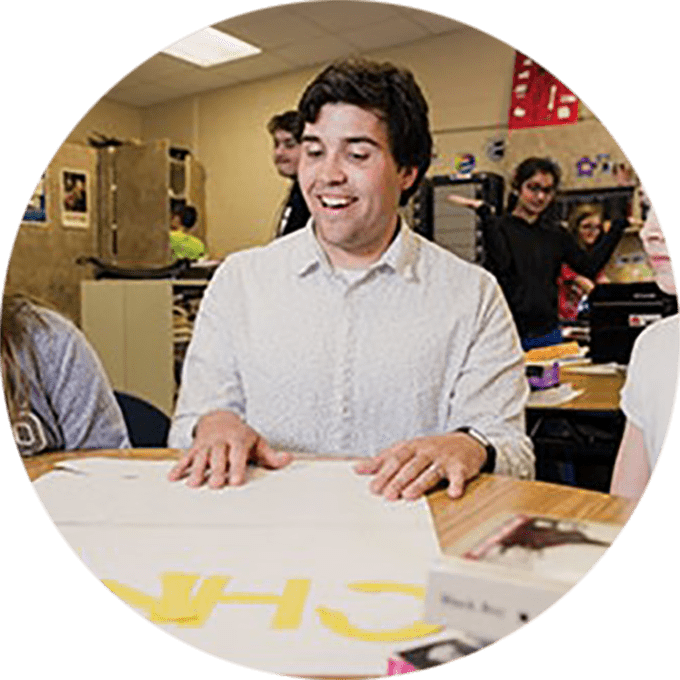Licensure, degree requirements, policies and reports
Learn more about our licensure standards, degree requirements, academic policies and program reporting.
At Earlham, believe that there is no more valuable calling than the work of education. We seek to “awaken the teacher within,” thereby equipping new educators with the skills and knowledge to shape their classrooms and workplaces into environments that foster lifelong learning in their own students.
Those who are best prepared to meet the challenge of education are well grounded in their content field, passionate about their learning, and courageous in their response to this calling.
The Earlham M.A.T. program is a unique post-baccalaureate teacher preparation program that began in 2001.
In creating the M.A.T. program, Earlham faculty sought to blend Charlotte Danielson’s Framework for Teaching with the Earlham College Principles and Practices. The program was also informed by two key works: Parker Palmer’s The Courage to Teach and Robert Fried’s The Passionate Teacher.
Secondary teachers and administrators provided significant input into the program’s creation, and the faculty of the Earlham M.A.T. program have continued a strong working relationship with these and other stakeholders.
Our Advisory Board meets annually with program faculty to provide feedback. More importantly, the M.A.T. program uses input from area teachers throughout the year in the assessment of teaching candidates.
From summer semester through spring semester, input and advice from current secondary teachers is a vital part of the process of teacher preparation.
The M.Ed. was program was added in 2005. At that time, this program focused on serving currently practicing teachers.
In 2018, the M.Ed. was revitalized to serve a wide range of candidates with different focuses in education. Partnerships on Earlham’s campus with Trueblood Preschool, the Joseph Moore Museum and the athletics department, as well as off-campus partnerships with local schools and non-profit community organizations make our M.Ed. program unique in its ability to be personalized to each individual candidate’s needs.
Complete a short form and we’ll be in touch with more information about Earlham’s Graduate Programs in Education.

Our faculty are dedicated to your success, both in our classrooms and in yours. Please reach out to us with any questions—we are happy to help.
Our faculty →The M.A.T. (Master of Arts in Teaching) program leads to a master’s degree and a teaching license. It is geared toward those who want to become a secondary classroom teacher. The M.Ed. (Master of Arts in Education) program leads to a master’s degree. It is geared toward those who want to enter or further their experience in a field of education other than the public classroom. Examples of careers include outdoor education, educational nonprofits, educational media and technology, museum work, journalism, and library science.
For the 2023-24 academic year, tuition will be the following:
We offer significant scholarships to help offset the cost of each program. For information about scholarships, contact [email protected].
Cohort numbers vary by year. They range from 10-25, with the average size being around 11 students.
M.A.T. candidates complete a two-week practicum in the summer. In August, candidates begin a year-long practicum (for M.A.T. candidates, this is student teaching) that usually concludes in mid-April. By January, candidates are at their placement every day.
For MEd, students have a practicum each semester, 40 hrs in the summer, 140 hrs each fall and spring. Practicum placements are decided by the student in consultation with faculty, and are flexible to meet the needs and goals of the student.
Students usually live close to campus in rented houses and apartments. It is not uncommon for groups of M.A.T. and M.Ed. students to live together. We can help you find housing options. While you do not need a car, we strongly recommend having one as it will make travel between campus and your placement much easier.
Yes, both for admission and for staying in the program. Students are expected to have roughly a 3.0 undergraduate GPA, and are expected to maintain a 3.0 GPA for the duration of the program. See admissions guidelines above.
M.A.T. students may have a part-time job; however, it may be challenging, given the demands of coursework and clinical work. M.Ed. candidates have more flexibility with jobs and, in many cases, their pre-existing job becomes their practicum placement.
The M.A.T. and M.Ed. are 11-month programs.* Admitted students will begin the program in early June and will continue for three semesters: summer semester, fall semester and spring semester. Graduation occurs in May. For more details, view the graduate academic calendar.
*Students pursuing the two-year M.Ed. graduate 23 months after beginning the program.
In general, M.A.T. classes meet 8:30-3:30 Monday-Thursday in the Summer semester (June and July). In the Fall semester, M.A.T. students are at their student teaching sites for the school day Monday, Wednesday, and Friday, and on Earlham’s campus taking classes Tuesday and Thursday. In the Spring semester, M.A.T. students are at their student teaching sites during the school day Monday-Friday, and have two evening classes a week on campus.
In general, M.Ed. classes meet 8:30-3:30 Monday-Thursday in the Summer semester (June and July). In the Fall and Spring semesters, M.Ed. students have classes from 8:30-11:30 Tuesday, Wednesday, and Thursday. M.Ed. students will work their 140 hours of Fall and Spring practicum outside of class hours. M.Ed. students on the two year track will have parts of the Summer semester off each year, and they will take classes one or two days a week (depending on the year and the semester) in the Fall and Spring semesters.